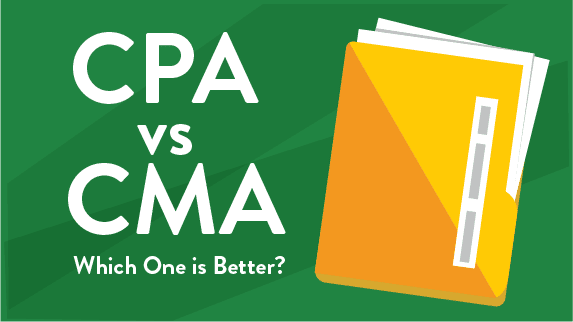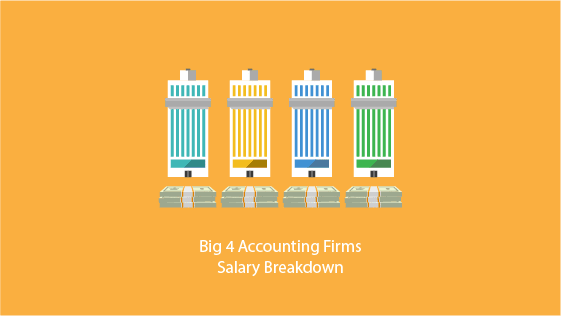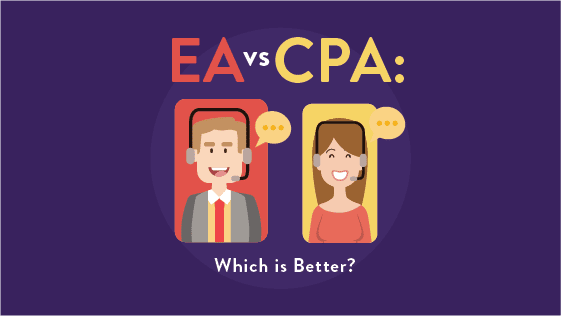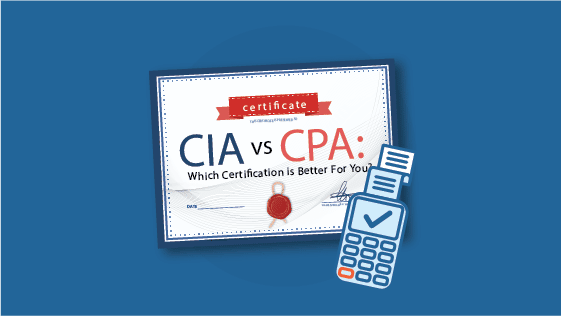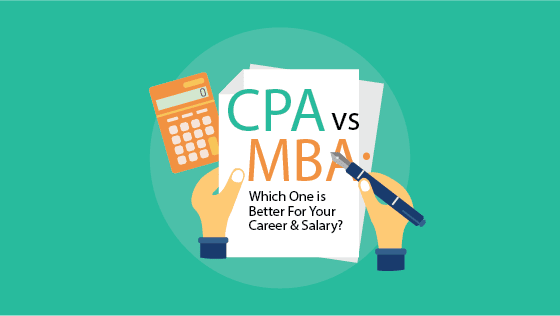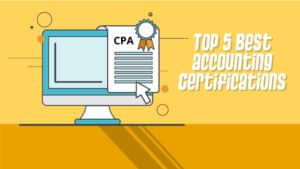
So, you want to shake up your accounting career but aren’t sure if you want to be a certified public accountant. Thankfully, there are lots of accounting certifications out there that can be used to enhance your career, but which one is the best?
And does it make sense to get more than one?
The truth is, there is no one-size-fits-all designation for accounting professionals. Each one is slightly different and has various career focuses. Although I chose to pursue CPA certification myself, I’ve learned a lot about other accounting certifications along the way.
Let’s look at the top accounting certifications together.
Best Certifications in Accounting
The most popular accounting certifications & licenses include:
- Certified Public Accountant (CPA)
- Certified Financial Analyst (CFA®)
- Certified Management Accountant (CMA)
- Enrolled Agent (EA)
- Certified Internal Auditor (CIA)
- Certified Information Systems Auditor (CISA)
- Chartered Alternative Investment Analyst (CAIA)
I’ll start with a quick overview of all the main certifications and point out a few of their differences. Take a look at my chart with the examination requirements and qualifications needed for the most popular certifications before we jump into the details.
Comparison Chart Of The Top 5 Accounting Certifications
| Certifications | CPA | CFA® | CMA | EA | CIA |
|---|---|---|---|---|---|
| Bachelor Degree | |||||
| Accounting Courses Required | |||||
| Number of Exams | 4 | 3 | 2 | 3 | 3 |
| Exam Dates per Year | 4 windows (9 months) | 1-2 times per year | 4 windows (6 months) | Year round | Year round |
| Exam Length | 16 hours | 18 hours | 8 hours | 12 hours | 6.5 hours |
| Estimated Costs | $2,500 | $3,700 | $1,750 | $1,500 | $1,500 |
1. Certified Public Accountant (CPA)
The Certified Public Accountant (CPA) credential, a cornerstone in the world of accounting certifications, is revered as the oldest and most distinguished designation in the profession. This credential is often perceived as the gold standard among finance professionals, reflecting its widespread recognition and the high regard it commands within corporate finance and public accounting.
CPA: A Multifaceted Credential in Accounting
- Exclusive Audit Authority: Unique among accounting certifications, only CPAs have the authority to write audit reports and offer opinions on financial statements of publicly traded companies, a crucial aspect of financial reporting and corporate management.
- State-Licensed Professionals: CPAs are the only accounting professionals licensed by state governments, a testament to their expertise in financial transactions and accounting principles.
- Tax and Representation Expertise: In the realm of tax professionals, CPAs stand out. They not only sign tax returns as paid preparers but also represent clients before the Internal Revenue Service (IRS), showcasing their proficiency in governmental accounting and tax law.
The Path to CPA Certification
- Rigorous CPA Exam: Aspiring CPAs face the formidable challenge of passing all parts of the AICPA uniform CPA exam, a process that underscores their commitment to professional ethics and industry-recognized certifications.
- Educational and Experience Prerequisites: To earn the CPA certification, candidates must meet specific educational benchmarks, often including a bachelor’s degree in accounting, and fulfill state-mandated work experience requirements.
“As a seasoned CPA, I’ve observed that many professionals choose the CPA designation over others due to its unparalleled recognition and versatility in the world of finance and accounting. The CPA credential is not just a certificate; it’s a symbol of trust, expertise, and comprehensive mastery in accounting. It opens doors to a myriad of opportunities, from auditing and tax advisory to high-level strategic decision-making roles in various industries. The CPA’s rigorous training and stringent ethical standards ensure that those who earn it are well-equipped to navigate the complexities of the financial landscape, making it a preferred choice for those aspiring to reach the pinnacle of their accounting careers.”
– Bryce Welker
Diverse Career Opportunities for CPAs
CPAs are not limited to traditional accounting roles; their expertise opens doors to a variety of positions in both the private and public sectors. Here’s a look at some of the roles they can fulfill:
- Public Accountant: Specializing in tax preparation, auditing, and consulting for individuals, corporations, and government entities.
- Management Accountant: Also known as corporate or private accountants, they record and analyze financial information for the organizations they work for.
- Forensic Accountant: Investigating financial crimes and disputes, often working with law enforcement agencies and attorneys.
- Financial Manager: Overseeing an organization’s financial health, including developing strategies and plans for long-term financial goals.
- Chief Financial Officer (CFO): Leading the finance department, responsible for financial planning, risk management, and financial reporting.
CPA Salary Expectations
- Entry-Level Earnings: On average, CPAs earn about $76,000 annually at the start of their careers, as reported by Payscale.
- Experienced CPA Salaries: With more experience in the field, CPAs can see their salaries rise significantly. Seasoned professionals, especially those in senior roles like financial managers or CFOs, can earn around $125,000 per year or more.
- Currently, the four most popular employers for CPAs are KPMG, Ernst &Young, RSM McGladrey Incorporated, and CliftonLarsonAllen. Each of these companies pays their CPAs very well for the area they live in and has a high job satisfaction rate among employees.
2. Chartered Financial Analyst (CFA®)
The Chartered Financial Analyst (CFA®) designation is a highly esteemed certification, primarily tailored for professionals aspiring to excel in the finance and investment sectors. Recognized globally, the CFA® credential is particularly revered among finance professionals, including those working on Wall Street, in hedge funds, investment funds, and in various roles within corporate finance.
Although the CFA® is not as popular as the CPA in the United States, it is one of the most internationally known accounting designations. In Europe and China this designation is much more popular.
To become a CFA®, you must pass the CFA® exam that is administered by the CFA® Institute. The exam process is much longer than the CPA exam because it is only tested one to two times each year depending on the level you are sitting for. The total exam time is also longer and costs more than the CPA exam.
Global Recognition and Versatility
- International Acclaim: While the CFA® may not be as widely recognized as the CPA in the United States, it holds significant prestige internationally, especially in financial hubs across Europe and China.
- Analytical and Strategic Skills: The CFA® program equips candidates with deep analytical skills, making them adept at navigating complex financial landscapes, and strategic thinking necessary for high-level decision-making in finance, investment, and business operations.
Career Opportunities and Growth
- Portfolio Management: Many CFAs commence their careers managing investment portfolios, where they make strategic decisions about asset allocation and investment strategies.
- Fund Management: With experience, CFAs often progress to roles such as fund managers, where they oversee large investment funds, making critical decisions that impact fund performance.
- Executive Roles: The pathway for a CFA® can lead to executive positions, including Chief Financial Officer (CFO), where they play a pivotal role in shaping the financial strategy of organizations.
Earning Potential of CFAs
- Average Salary: CFAs typically earn an average annual salary of around $104,000. This figure varies based on factors like location, industry, and the specific role within the financial sector.
- Senior-Level Earnings: Experienced CFAs, especially those in senior roles or with specialized skills, can command salaries exceeding $120,000 annually.
- You may want to look into some of the more popular companies when looking for work as a CFA. Currently, JP Morgan, Bloomberg, Ernst & Young, and Bank of America are the highest-rated employers for CFAs in the United States.
CFA® Salary
CFAs can expect to make around $97k as an annual salary, according to Payscale. Those who’ve been in the business for a longer time can end up making over $120k if they leverage their experience well. You can also check out this Reddit thread that includes first-hand accounts from actual CFAs discussing how much they make.
You may also want to look into some of the more popular companies when looking for work as a CFA. Currently, JP Morgan, Bloomberg, Ernst & Young, and Bank of America are the highest-rated employers for CFAs in the United States.
3. Certified Management Accountant (CMA)
The Certified Management Accountant (CMA) is a specialized professional designation that stands distinct in the field of management accounting. Unlike the Certified Public Accountant (CPA) certification, which is more aligned with public accounting, the CMA focuses intensely on the strategic management aspect within businesses. The CMA certification is particularly valuable for professionals aiming to excel in internal management and executive-level roles, such as Chief Operating Officer (COO) or Chief Financial Officer (CFO).
Unique Focus and Career Path of CMAs
- Management-Centric: The CMA designation is tailored for those who aspire to lead in corporate finance and strategic management, rather than public accounting practices.
- Executive Aspirations: It is an ideal pathway for those targeting executive positions in large corporations, especially in Fortune 500 companies, where strategic financial management is key.
“As an expert in the field of accounting and finance, I can confidently say that the Certified Management Accountant (CMA) designation stands as a compelling alternative to other certifications for those who are keen on diving deep into the strategic aspects of business finance. The CMA focuses intensely on the internal management side of businesses, blending financial expertise with strategic decision-making skills. This makes it particularly valuable for professionals aiming to play a pivotal role in corporate financial planning, analysis, and decision-making. Unlike other certifications that may lean more towards public accounting or external auditing, the CMA equips individuals with the tools to drive business success from within, making it an excellent choice for those aspiring to roles like Financial Controller, CFO, or other strategic financial management positions.”
– Bryce Welker
CMA Certification Process
- Exam Requirements: CMA candidates are required to pass an exam that is about half the size of the CPA exam and is administered by the Institute of Management Accountants (IMA). There are also specific and strict requirements to sit for the exam.
- Educational and Experience Prerequisites: The Institute of Management Accountants (IMA) mandates specific educational qualifications, including a bachelor’s degree with a requisite number of credits in certain subjects, and at least two years of work experience in management accounting or financial management.
Earning Potential and Employment Landscape
According to Payscale, CMAs typically make an average of $100k each year. Of course, you can increase your annual pay to as much as $150k if you have the right combination of education and work experience.
CMA Careers
The career landscape for Certified Management Accountants is witnessing a promising expansion, with an anticipated employment growth of 7% over the next decade, mirroring the growth trajectory of Certified Public Accountants (CPAs). This growth can be attributed to the increasing recognition of the CMA’s value in both financial and strategic business roles.
I recommend trying to find work at Cummins Inc, Eaton, Amazon, or Magna International, as they’re currently the most popular employers for CMAs in the United States. Make sure to research them before you apply, though, since each one has something unique they offer their employees.
Early Career and Progression
- Starting as Junior Accountants: CMAs often embark on their professional journey in junior accounting roles. Here, they gain valuable experience in various aspects of financial accounting and management.
- Transition to Management Accounting: With experience, CMAs typically advance to management accounting positions. In these roles, they play a crucial role in financial planning, analysis, and decision support within organizations.
Beyond Traditional Roles
- Consulting and Advisory Services: Experienced CMAs may venture into consulting, offering their expertise in financial management and strategy to a variety of clients.
- Financial Leadership Roles: The path for a CMA can lead to senior leadership positions, such as Financial Controller, Finance Director, or even Chief Financial Officer (CFO), where they oversee the financial operations and strategy of an organization.
4. Enrolled Agent (EA)

Created by the IRS, the enrolled agent certification is used to demonstrate one’s knowledge of the US tax code and the ability to apply its concepts. Since the EA designation is specifically focused on US taxation of all entity types (both individuals and corporations), this designation does not educate you on any finance, auditing, management, or other business topics. It’s strictly a tax certification. If you have this, you know taxes.
If your career goal is in either tax preparation or internal tax work for a company, this would be a good credential to go after. One thing to know is that all public accounting firms will want you to have your CPA over your EA, so if that’s your goal, you should start with the CPA.
Enrolled agents do have several responsibilities that CPAs can do as well, such as signing tax returns as paid preparers and representing clients in front of the IRS. This makes the EA designation somewhat useful in public accounting, but most states have additional laws for public firms that restrict ownership and authority to CPAs.
If you want to be a tax professional who doesn’t want to deal with all the education and experience requirements for the CPA exam, the EA designation is meant for you. It allows them to have many of the same rights as CPAs without the certification. To become an EA, you will have to take the enrolled agent exam administered by the IRS. The exam consists of three parts and is 12 hours long.
Diverse Career Paths for Enrolled Agents
While the job outlook for Enrolled Agents may not match the national average for all occupations, the certification opens doors to a range of stable and rewarding career opportunities, particularly in the field of taxation.
Core Roles and Progression
- Tax Manager: EAs often begin their careers in tax management roles, where they oversee tax planning, compliance, and strategy for businesses or individual clients.
- Tax Examiner: Working as tax examiners, EAs review tax returns, conduct audits, and ensure compliance with tax laws and regulations.
Expanding Beyond Traditional Tax Roles
- Tax Consulting and Advisory: EAs provide specialized tax advice to clients, helping them navigate complex tax situations and optimize their tax positions.
- Representation Before the IRS: One of the unique privileges of being an EA is the authorization to represent taxpayers before the Internal Revenue Service (IRS) in matters such as audits, collections, and appeals.
Independent Practice
- Self-Employment: EAs have the option to establish their own tax practice, providing services directly to clients and businesses. This path offers flexibility and the potential for entrepreneurship in the field of taxation.
EA Salary
Enrolled Agents don’t make quite as much money as other certifications. Payscale reports that EAs make an average of $69k annually. However, that can increase to almost $90k if you stick with the career for long enough.
Right now, the most popular employers for EAs are H&R Block, Jackson Hewitt Tax Services, and Intuit. Your work will be fairly similar in each company, so I recommend trying whichever one you like best.
5. Certified Internal Auditor (CIA)
This designation is strictly for compliance officers and auditors. A CIA typically works for a larger company performing audit procedures and helping independent auditors. In order to gain this certification, you must complete the three sections of the CIA exam, totaling 6.5 hours of testing. If you are looking for a career in auditing, the CIA certification is for you.
Broad Spectrum of CIA Career Opportunities
The CIA designation opens doors to a variety of roles within organizations, offering a stable and promising career path in the field of auditing and compliance.
Core Roles and Career Progression
- Internal Auditor: CIAs typically start their careers as internal auditors, assessing the operational efficiencies and compliance with regulations within an organization.
- Audit Manager: With experience, CIAs often move up to audit manager positions, overseeing audit projects and leading audit teams.
Expanding into Specialized and Senior Roles
- Risk Management: CIAs are well-equipped to work in risk management, identifying and mitigating financial, operational, and strategic risks.
- Compliance Officer: In this role, CIAs ensure that organizations comply with external regulatory requirements and internal policies.
- Forensic Auditor: Specializing in forensic auditing, CIAs investigate financial discrepancies, fraud, and ensure adherence to anti-fraud controls.
Opportunities in Diverse Industries
- Financial Services: Many CIAs find opportunities in banking, insurance, and investment firms, where they audit financial and business processes.
- Government Agencies: CIAs also work in government sectors, contributing to the public sector’s financial accountability and transparency.
- Healthcare and Manufacturing: These industries offer roles for CIAs to audit their complex and regulated operations.
CIA Salary
CIAs make a great deal of money, which is likely due to the difficulty of their work. The current average annual pay for a CIA is $97k. That can increase to as much as $142k as an Internal Audit Director.
When looking for work, make sure to check out Citibank, JCPenney, Ernst & Young, and JP Morgan. Payscale reports them as the four most popular employers for Certified Internal Auditors.
FAQs
All of these certifications are difficult to obtain because they all have lengthy exams and qualifications that must be met in order to become certified. The certification with the shortest exam and least amount of requirements is the CIA designation. Keep in mind though, this is also the most limited accounting credential.
There is no easy answer to this question because there is still a great debate over which accounting certification is the most difficult. I think it is tied between the CPA and CFA® because both have strict requirements to sit for the exam. Not to mention that both exams are extremely difficult with low average passing rates. But, since these certifications are known to be difficult to get, they are the most respected and most useful credentials on the list.
Many accounting professionals ask themselves these questions, and the answer honestly depends on your career path and your specialization. For example, if you have your CPA license and you want to get into finance and invest more, a CFA® designation is a logical choice. You don’t need it, but it will help your career. I would suggest just getting your CPA license license if you are not looking to specialize in any particular area. This is the most recognized and useful accounting certification.
Again, adding an MBA to your credentials depends on your career path and where you want to be in the future. An MBA will help you attain higher management roles in corporate America, but it will also cost you a lot of money. Most states require at least 150 credit hours to obtain your CPA license, so it does make sense to get an MBA to fulfill those extra hours. If you are lucky and your employer will help pay for your graduate tuition, you should definitely get your MBA. The CPA-MBA combo is pretty much an unstoppable combination.
You’ve probably figured out the answer to this for yourself, but there isn’t an overall best accounting certification. They are all good for different things, and you should go for the certification that is most in line with your career goals. If you are unsure of your exact career goals within accounting, the CPA credential is by far the most respected and most widely used certification. So, if you are going to go for just one, I would recommend getting your CPA license. Once you’ve made up your mind, it’s time to start studying! Check out my top CPA review courses which can help you pass your exam and achieve your career goals.
This largely comes down to what your career goals are. Earning your MBA is expensive and takes time, but it applies to more positions overall. On the other hand, a CFA designation takes less time but requires you to pass three difficult exams. Plus, your credentials will be much more specialized overall.
The CPA exam is generally considered to be harder than the CFA exam. This is mainly because of the low pass rates for the CPA exam as well as its being split into four different exams. Of course, the CFA exam is difficult too, but pass rates are slightly higher, and it only consists of three tests.
As with other certifications, this depends on how much time you intend to study for each test. It’s generally recommended that you spend at least one month studying for each of the three exams. However, you’ll most likely need more time than that to prepare for your certification.
It depends on what type of job you’re interested in. CPAs have a much more flexible skill set that can be applied to many different positions. By contrast, EAs focus almost entirely on managing tax arrangements for businesses and private entities.
Generally speaking, the CPA exam is considered the more difficult test. It’s split into four parts, and the time limit to complete each exam before the scores expire is fairly strict. The CIA exam isn’t easy by any means, but it’s much more focused on a few key areas and only consists of three exam parts.
People usually consider Part 3 of the CIA exam to be the most difficult. This is because it focuses on more specialized topics, such as financial management and informational security. These topics are in contrast to the more general knowledge tested on parts 1 and 2 of the CIA exam.
It depends on what type of job you’re interested in. CPAs have a much more flexible skill set that can be applied to many different positions. By contrast, EAs focus almost entirely on managing tax arrangements for businesses and private entities.
Generally speaking, the CPA exam is considered the more difficult test. It’s split into four parts, and the time limit to complete each exam before the scores expire is fairly strict. The CIA exam isn’t easy by any means, but it’s much more focused on a few key areas and only consists of three exam parts.
People usually consider Part 3 of the CIA exam to be the most difficult. This is because it focuses on more specialized topics, such as financial management and informational security. These topics are in contrast to the more general knowledge tested on parts 1 and 2 of the CIA exam.
Bryce Welker is a regular contributor to Forbes, Inc.com, YEC and Business Insider. After graduating from San Diego State University he went on to earn his Certified Public Accountant license and created CrushTheCPAexam.com to share his knowledge and experience to help other accountants become CPAs too. Bryce was named one of Accounting Today’s “Accountants To Watch” among other accolades. As Seen On Forbes
